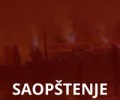On Acquittal for the Crimes in Tenja
 On 6 April 2015, the Trial Chamber of the War Crimes Department of the Higher Court in Belgrade (the Chamber) rendered a judgment finding Žarko Čubrilo not guilty of a war crime against civilians committed in the first half of July 1991 in Tenja (Republic of Croatia). The Humanitarian Law Center (HLC) points out that the decision of the Chamber is based on an erroneous interpretation of key pieces of evidence and a disregard of the most important sections of the statements by eye-witnesses.
On 6 April 2015, the Trial Chamber of the War Crimes Department of the Higher Court in Belgrade (the Chamber) rendered a judgment finding Žarko Čubrilo not guilty of a war crime against civilians committed in the first half of July 1991 in Tenja (Republic of Croatia). The Humanitarian Law Center (HLC) points out that the decision of the Chamber is based on an erroneous interpretation of key pieces of evidence and a disregard of the most important sections of the statements by eye-witnesses.
The indictment issued by the Office of the War Crimes Prosecutor (OWCP) against Žarko Čubrilo alleged that Čubrilo, acting as a member of the local Territorial Defence force (TO) in the first half of July 1991, took 11 Croatian civilians, mostly elderly people (Ivan Valentić, Marija Cerenko, Ana Horvat, Katica Kiš, Pera Mamić, Josip Medved, Stipe and Evica Penić, Josip Prodanović, Vladimir Valentić and Franjo Burč), out of the make-shift prison set up in the “Partizan” cinema hall in Tenja, after which he ordered Jovo Ličina and Savo Jovanović to tie the civilians’ hands. He then put the civilians on a truck and drove them to a place near a livestock burial site outside the village of Bobota. On arriving there, he ordered the civilians out of the truck, and shot them in the head with his automatic rifle one by one as they got out of the truck.
Stating the reasons for its judgment, the presiding judge, Dragan Mirković, said that the court could base its judgment solely on those facts of the certainty of which it was convinced. However, the court was not convinced that the facts set out in the indictment against Žarko Čubrilo were certain. The Chamber found “a number of contradictions“ in the statements given by witnesses Milan Macakanja and Jovo Ličina, who accused defendant Čubrilo of killing the civilians. Witness Macakanja stated that the civilians were killed near the livestock burial site while he was standing next to the truck, whereas witness Jovo Ličina said that the killings took place in a wood, and that Macakanja never got out of the truck. According to the presiding judge, the court was not able to establish who was with them while the civilians were being transported, or who exactly drove the truck. The presiding judge also pointed out that most of the witnesses mentioned that a large number of people had gathered while the civilians were loaded onto the truck, but none of them mentioned that defendant Čubrilo had been among the people gathered. Although the injured parties had no direct knowledge of the event itself, they said they had heard rumours that Macakanja had murdered Ana Horvat, but none of them had heard that Čubrilo had been involved in this murder. The presiding judge concluded by saying that since the bodies of the murdered civilians were never found, the statements by witnesses Ličina and Macakanja could not be verified by an autopsy.
The HLC considers that the court, when acquitting the accused, gave far too much weight to the discrepancies between the testimonies of the key witnesses, Macakanja and Ličina, while flagrantly ignoring the key parts of their testimonies, related to the very act of the murder of the civilians in Tenja, which are fully consistent with each other. Despite certain inconsistencies in their statements, both witnesses who saw the killing of the civilians, gave identical statements with regard to the crucial event – that the civilians, immediately before being murdered, got out of the truck one by one, and that defendant Žarko Čubrilo shot them in the head with his automatic rifle. The discrepancies in their statements relating to the facts of who drove the truck and where exactly the killing took place (Macakanja said it was at the livestock burial site, whereas Jovo Ličina said they drove past it and then stopped), are not of such a nature that they can cast doubt on the crucial fact of who killed the civilians and how, of which both witnesses spoke in an identical way.
Giving an oral explanation of the reasons for the judgment, the presiding judge referred also to the statements of the injured parties, who were not in Tenja at the relevant time and therefore had only very limited and indirect knowledge of the murder of their family members. At the same time, the presiding judge made no comments regarding the testimony of witness Jovo Rebrača, which should have higher evidentiary value than the statements of the injured parties. This witness was Commander of the Tenja TO force in 1991, and thus his knowledge about the event, given his rank and presence in Tenja at the relevant time, should have had a much higher evidentiary value than that of the injured parties. Witness Rebrača said at the trial that, according to his indirect knowledge, Žarko Čubrilo was one of the “actors in the event“.
The HLC points out that the crimes that were committed in Tenja and its surroundings at that time have remained largely uninvestigated, and that not a single perpetrator of these crimes has been convicted. In 2011, the HLC filed a criminal complaint with the OWCP against 30 members of the TO, the Yugoslav People’s Army (JNA), the local police department and other formations, some of whom are certainly located in Serbia, for the murder of 29 civilians from Tenja, the unlawful deprivation of liberty, imprisonment, torture and intimidation of dozens of civilians, and the persecution and displacement of some 3000 local residents of Croatian ethnicity. The HLC also put forward 37 individuals as witnesses to these events, and suggested that the OWCP obtain from the Osijek County Court the Krz-49/08-8 case file and other relevant documents. The Osijek County Court tried Boško Surla, but he was finally and conclusively acquitted.
Case information
The case against Žarko Čubrilo was transferred from the Croatian to the Serbian judiciary on the basis of the Agreement on Mutual Cooperation in Prosecution of Perpetrators of War Crimes, Crimes against Humanity and Genocide, signed between the OWCP and the Office of the Attorney-General of the Republic of Croatia. The indictment (available only in Serbian) against Žarko Čubrilo and Božo Vidaković was filed on 22 June 2012. During the trial, which commenced on 29 October 2012, the court heard 43 witnesses. The injured parties were represented by the HLC.
The same OWCP indictment charged Božo Vidaković with a war crime against prisoners of war and civilians, committed between 7 July and the end of August 1991 in Tenja, but the proceedings against him were separated in 2014, because Vidaković was unable to appear in court due to health reasons, and because he was accused of taking part in events that had nothing to do with the events Žarko Čubrilo was charged with participating in.
The HLC report from the trial of Žarko Čubrilo can be read here (available only in Serbian).







